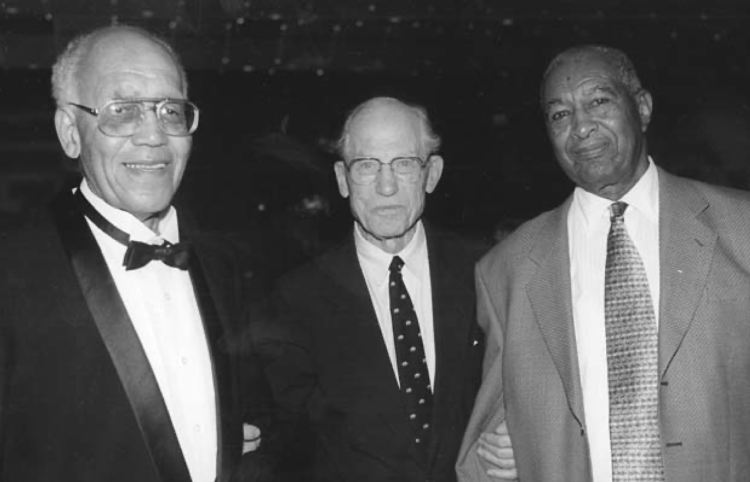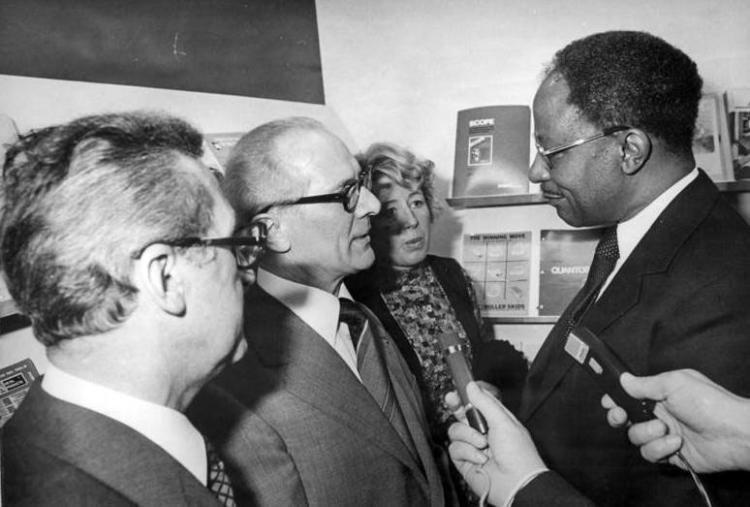On the playing field, CU’s opponent was racism
A Black history snapshot: student legislators and university leaders fought against ‘gentlemen’s agreement’ to bar Black players
In 1946, the student government at the University of Colorado Boulder began a crusade against racial discrimination.
Unanimously, the student legislators declared that any group discriminating against “any race, color or religion” should be barred from using university buildings for meetings, refused news coverage in the student newspaper and “not be recognized in any manner” by student government.
After CU Boulder joined the Big Seven Conference in 1947, student groups at a meeting of the conference universities passed a resolution condemning discrimination against Black student-athletes and, as the CU Boulder student newspaper editorialized, against a “gentlemen’s agreement behind the scenes” that prevented Black athletes from playing on teams in the conference.

At the top of the page: Gil Cruter clearing a high jump (CU Athletics). Above: From left to right: CU star athletes in the 1930s, Gil Cruter, Byron R. Whizzer White and Claude Walton pose at the 1999 Colorado Athletic Hall of Fame ceremonies, when Cruter was inducted.
“Robert L. Stearns (then the university president) doesn’t like that rule,” wrote the paper, then called the Silver and Gold. “Neither do a lot of other persons who believe that the athletic field is one of the last places in which to discriminate against a man because of the color of his skin.”
The editorial concluded: “If we are to have a university worthy of the name, it means that when a hand is extended for a ‘gentlemen’s agreement’—a white gentlemen’s agreement—we say, ‘No thanks. We’re not having any.’ And mean it. We don’t want any.”
None of the other Big Seven universities formally challenged CU Boulder’s Black players, but Missouri and Oklahoma had rules that would have allowed them to challenge players on visiting teams.
In 1949, Stearns noted that the players were both athletes and scholars: “Men like Gil Cruter and Dave Bolen have made a real contribution to this university. We are exerting every effort to make it possible for others of their race to represent Colorado wherever we may play.”
Amen, said the Silver and Gold, writing that the battle against racial discrimination was central to the CU’s educational mission: “There is no more appropriate place to carry on education against bigotry than a state university.”
Stearns was right about Cruter and Bolen.
In 1936, Cruter became a two-time world high-jump record-holder. A Denver native, Cruter was CU's second African American athlete and an alternate on 1936 Olympic team. He was a two-time NCAA Champion in the high jump.
He weathered discrimination while competing for CU. He once said: “When (coach) Frank Potts would take us to the Kansas Relays, the team would stay at a hotel while I was placed with a private family, because blacks were not allowed to stay in the hotels.”

Ambassador David Bolen (right), Leipzig, Germany, March 12, 1978 (Hubert Link, Courtesy German Federal Archives).
Cruter, who earned a degree in physical education and a minor in science from CU Boulder in 1939, was the first African American teacher and, later, administrator, in the Denver Public School system.
Cruter became one of the first international ambassadors of all sports working for the U.S. State Department, where he worked as a diplomat in Africa. In 1961, he accepted a position with the United States Agency for International Development as the cultural affairs attaché in Monrovia, Liberia and as Public Affairs Console in Nigeria.
Bolen, who served in the Army Air Force in World War II, came to CU Boulder at the invitation of coach Potts. Bolen also faced discrimination during his time here: He was not allowed to live in the men’s dormitories, so stayed with a woman who worked in a sorority house and fed him the sorority’s leftovers.
Also in Boulder, he once had to drive 30 miles to find a barber who would cut his hair.
Bolen, who earned his MBA at CU in 1950, was the university’s first Olympian. He competed in the 1948 Olympics in London, taking fourth in the 400-meter run. In 1949, he won the 600-meter run at the National AAU Championships.
In 1974, President Nixon appointed Bolen to be ambassador to Botswana, Lesotho and Swaziland. In 1977, President Carter named Bolen ambassador to East Germany, making him the first Black ambassador to a country behind the “Iron Curtain.”
Bolen won the Alumnus of the Century Award from CU Boulder in 1977, the Norlin Distinguished Alumni Award for professional achievements in 1969 and the Department of State Superior Service Award in 1973. He also established a scholarship in his name.
As Bolen once said, “I never liked the fact that athletes were considered to be dumbbells.”
Sources: Glory Colorado, a History of the University of Colorado, 1858-1963, The Coloradan, CU Buffs.com and Allbuffs.com.

